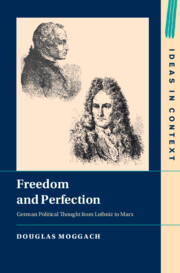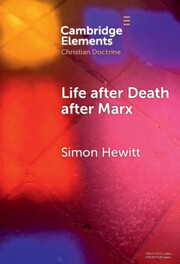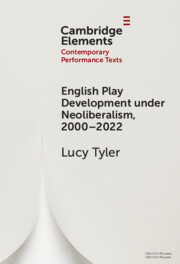Refine search
Actions for selected content:
70 results
Chapter 6 - Coda: The English Market as the Temple of Jerusalem
- from Part III - The Workshop
-
- Book:
- The Desire for Syria in Medieval England
- Published online:
- 01 December 2025
- Print publication:
- 18 December 2025, pp 187-191
-
- Chapter
- Export citation
The Kantian Critique of Marx’s Property Theory
-
- Journal:
- Kantian Review , First View
- Published online by Cambridge University Press:
- 13 November 2025, pp. 1-19
-
- Article
- Export citation
Conclusion: Beyond Hegel
-
- Book:
- Hegel Beyond Liberalism
- Published online:
- 27 September 2025
- Print publication:
- 16 October 2025, pp 207-213
-
- Chapter
- Export citation
Chapter 5 - The Dialectic of Economic Freedom
- from Part II - Hegel Beyond Liberalism
-
- Book:
- Hegel Beyond Liberalism
- Published online:
- 27 September 2025
- Print publication:
- 16 October 2025, pp 130-188
-
- Chapter
- Export citation
Reading Commodities
-
-
- Book:
- Commodities and Literature
- Published online:
- 14 October 2025
- Print publication:
- 09 October 2025, pp 1-28
-
- Chapter
- Export citation
The tripartite structure of critical international theory
-
- Journal:
- International Theory / Volume 17 / Issue 3 / November 2025
- Published online by Cambridge University Press:
- 15 August 2025, pp. 447-477
-
- Article
-
- You have access
- Open access
- HTML
- Export citation

Freedom and Perfection
- German Political Thought from Leibniz to Marx
-
- Published online:
- 25 July 2025
- Print publication:
- 14 August 2025
Chapter 3 - After and Beyond Vico
-
- Book:
- Vico and the Maker's Knowledge Tradition
- Published online:
- 27 June 2025
- Print publication:
- 17 July 2025, pp 88-117
-
- Chapter
- Export citation

Life after Death after Marx
-
- Published online:
- 18 March 2025
- Print publication:
- 17 April 2025
-
- Element
- Export citation

English Play Development under Neoliberalism, 2000–2022
-
- Published online:
- 18 March 2025
- Print publication:
- 17 April 2025
-
- Element
-
- You have access
- Open access
- HTML
- Export citation
Chapter 5 - Schopenhauer’s Polemics
-
- Book:
- Schopenhauer's Politics
- Published online:
- 09 January 2025
- Print publication:
- 23 January 2025, pp 159-201
-
- Chapter
-
- You have access
- Open access
- HTML
- Export citation
15 - Rights and Socialism 1750–1880
- from Part II - Postrevolutionary Rights
-
-
- Book:
- The Cambridge History of Rights
- Published online:
- 22 January 2025
- Print publication:
- 28 November 2024, pp 361-383
-
- Chapter
- Export citation
14 - Rights in the Thought of Kant, Fichte, and Hegel
- from Part II - Postrevolutionary Rights
-
-
- Book:
- The Cambridge History of Rights
- Published online:
- 22 January 2025
- Print publication:
- 28 November 2024, pp 341-360
-
- Chapter
- Export citation
2 - Comparison
- from Part I - Forms of Inquiry and Argumentation
-
-
- Book:
- Rethinking Global History
- Published online:
- 14 November 2024
- Print publication:
- 21 November 2024, pp 47-69
-
- Chapter
-
- You have access
- Open access
- HTML
- Export citation
1 - The Dialectical Agroecologist
-
- Book:
- The Dialectical Agroecologist
- Published online:
- 31 October 2024
- Print publication:
- 14 November 2024, pp 1-24
-
- Chapter
-
- You have access
- HTML
- Export citation
Marx on Leisure: An Aristotelian Interpretation
-
- Journal:
- Canadian Journal of Political Science/Revue canadienne de science politique / Volume 57 / Issue 2 / June 2024
- Published online by Cambridge University Press:
- 13 May 2024, pp. 325-343
-
- Article
-
- You have access
- Open access
- HTML
- Export citation
Chapter 16 - Revolutionary Politics
- from III - Politics, Ideas, and Bodies
-
-
- Book:
- Wagner in Context
- Published online:
- 14 March 2024
- Print publication:
- 14 March 2024, pp 159-167
-
- Chapter
- Export citation
The limits of currency politics
-
- Journal:
- European Law Open / Volume 2 / Issue 3 / September 2023
- Published online by Cambridge University Press:
- 10 January 2024, pp. 636-653
-
- Article
-
- You have access
- Open access
- HTML
- Export citation
2 - Contradictions in the Concept of Work
- from Part I - Problems in Analyses of Meaningful Work
-
- Book:
- The Politics of Working Life and Meaningful Waged Work
- Published online:
- 02 November 2023
- Print publication:
- 16 November 2023, pp 19-49
-
- Chapter
- Export citation
Chapter 4 - “Bad News for Priests”
- from Part II - The Beginnings of Change
-
- Book:
- Nietzsche's Struggle against Pessimism
- Published online:
- 02 November 2023
- Print publication:
- 16 November 2023, pp 129-152
-
- Chapter
- Export citation
